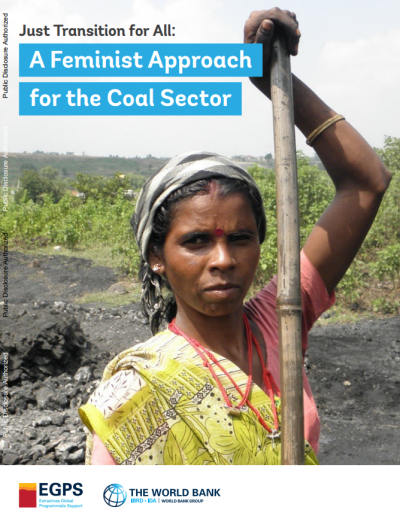
- Report year:2022
- Report author: Lahiri-Dutt, Kuntala
- Organisation: World Bank Group
This report explores the gendered impacts of coal sector transition with a focus on major coal- producing countries in the Global South.
Coal has been an integral part of the global energy system for over 200 years; even today, millions of women and men around the world are directly or indirectly dependent on coal-based industries, mines, and electricity generation firms for their livelihoods. Currently, the world is experiencing a fundamental shift in global energy systems: an increased awareness of the harmful effects of high-emitting coal-fired power generation has led to the closure of coal mines and thermal power plants, greater use of natural gas, and a rapid increase in the availability and affordability of alternative and renewable energy sources. In considering coal sector transitions as a response to climate change, we therefore need to consider whether relevant policies and practices respond to the gender differentiated needs of women and men in coal affected communities. The aim is to understand coping mechanisms such as male outmigration and the formation of women’s collectives to create space for agency and change, and to develop an analytical framework that can dig deeper into rigid social relations to ensure women’s wellbeing in the new low-carbon economy.
Coal has been an integral part of the global energy system for over 200 years; even today, millions of women and men around the world are directly or indirectly dependent on coal-based industries, mines, and electricity generation firms for their livelihoods. Currently, the world is experiencing a fundamental shift in global energy systems: an increased awareness of the harmful effects of high-emitting coal-fired power generation has led to the closure of coal mines and thermal power plants, greater use of natural gas, and a rapid increase in the availability and affordability of alternative and renewable energy sources. In considering coal sector transitions as a response to climate change, we therefore need to consider whether relevant policies and practices respond to the gender differentiated needs of women and men in coal affected communities. The aim is to understand coping mechanisms such as male outmigration and the formation of women’s collectives to create space for agency and change, and to develop an analytical framework that can dig deeper into rigid social relations to ensure women’s wellbeing in the new low-carbon economy.
